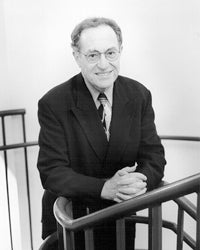Harvard Law School Professor Alan M. Dershowitz is retiring at the conclusion of the fall semester, and on Oct. 7 the school hosted a celebration of his 50-year career with an afternoon of panels recognizing his accomplishments and the influence he’s had on law, teaching, scholarship and society. Participants included current and former colleagues and students, judges, and legal analysts.
While the event focused largely on Dershowitz’s many contributions to academia, law and society, it also provided panelists with opportunities to offer personal recollections.
As a member of a panel examining Dershowitz’s influence on the law, Boston criminal-defense lawyer Martin Weinberg ’71 recalled coming to HLS as a first-year student in 1968, during the Vietnam War and a time of deep social unrest, intent on being a trial lawyer who would fight against the government but finding little support in the law school to guide him in meeting his professional goal.
“In 1968, there was no Gertner, no Ogletree,” he said. “Alan was the single role model, the mentor, the lodestar for those of us who came not to be Wall Street lawyers but to be trial lawyers and to learn how to defend people’s liberty.”
Forty-five years later, the celebration provided Weinberg with an opportunity to publicly thank Dershowitz for his help then and his ongoing work supporting the criminal-defense bar.
You have allowed us to be braver,” he said. “You have allowed us to know that in this lonely battle, where a single defense lawyer stands up next to a charged citizen that we are not alone, that we have a rock to lean on.”Boston criminal-defense and civil-liberties lawyer Harvey A. Silverglate had a similar tale to tell, describing what it was like to be a first-year student at HLS in 1964, the same year Dershowitz came to Harvard at age 25 as the youngest associate professor in the school’s history. Silverglate related that he’d grown somewhat disenchanted with law school and thought about quitting so that he could pursue a career in journalism but Dershowitz dissuaded him and put him in touch with a well-known Boston criminal-defense lawyer who gave him a research job. Silverglate love the job and set his sights on becoming a trial lawyer.Silverglate said their relationship has continued ever since as friends and professional colleagues working together on cases and he says he’s been impressed by Dershowitz’s own work product throughout that time.
“Alan is one of the rare people with the energy, focus and talent to have four simultaneous careers: teacher/scholar, lawyer, writer, and promoter of causes in his role as a public intellectual,” Silverglate said. “I’ve been observing him for decades, wondering when his legendary energy will begin to ebb. I’m still watching and waiting.”
A second panel focused on Dershowitz’s classroom work, which he has always maintained is his highest professional priority.
Dean Martha Minow pointed out that while that may be true, his interest in teaching actually extends well beyond the classroom.
“Alan is always teaching,” she said. “Alan sits down at the faculty lunch table when people are talking about what’s in the New York Times or the sports scores and Alan asks a question. And then he asks another question. And the discussion gets deeper and deeper and deeper. And then Alan leaves because he has other things to do and people are still arguing.”
Joel B. Pollak ’09, former student of Dershowitz’s who is now editor-in-chief and in-house counsel at the conservative Breitbart News, said that Dershowitz has always enjoyed support from conservative students.
“I think the fact that Alan’s students run that spectrum is a testament to how passionate he is about teaching, how effective he is teaching and reflects his enthusiasm for challenging students to form arguments that are different from those we’re used to, to consider alternative points of view, to move beyond taboo and think about what our true beliefs are,” Pollak said.
Another panel examined Dershowitz’s role as a public intellectual, including his work as legal commentator on television.
Television journalist Geraldo Rivera, who has a J.D. from Brooklyn Law School, credited Dershowitz with creating a new profession: “lawyer as television pundit.”
He said that prior to the O.J. Simpson murder trial in 1994 and Dershowitz’s involvement with the Simpson defense team, lawyer commentators were rare.
“He was the first, and he was the best, of all the TV lawyers,” Rivera said.
Jeffrey Toobin ’86, staff writer at The New Yorker and senior legal analyst for CNN, also picked up on Dershowitz’s involvement in the Simpson case as a watershed.
“The O.J. Simpson case was such a tremendous learning experience for the country,” he said. “Alan was such a wonderful spokesman for just what the rules are and how you can’t just dislike somebody in order to convict them of a crime like that. Even though I disagreed with the verdict in the case, I thought Alan did a tremendous public service and has always done a tremendous public service, particularly on television.”
Throughout the celebration, Dershowitz ended each panel with comments of his own and concluded with an assessment of which element of his career has brought him the most satisfaction.
“It’s teaching,” he said. “The thing that makes teaching so amazing is that I’m teaching students today who will be influencing the world 50 years from now. It’s rare to have a profession where you can have such continuing influence.”
